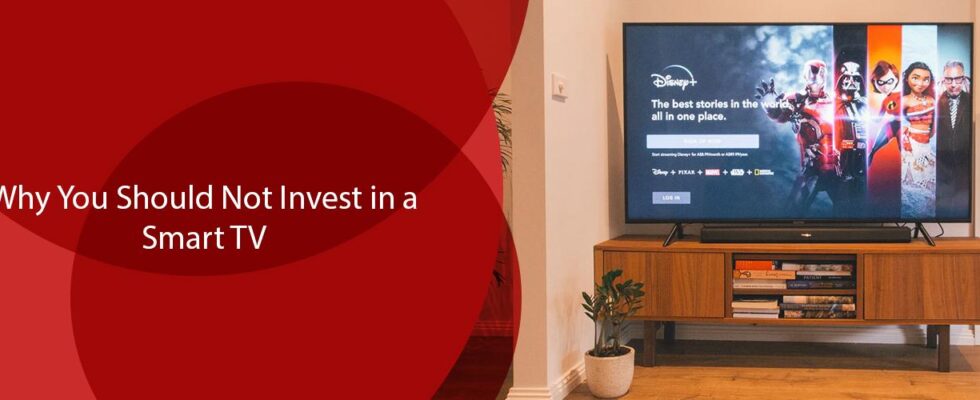Smart TVs, which were once considered luxury items, are now the typical offering in the television market. Almost all of the TV models you will encounter when browsing an electronics store or shopping online for a new TV are smart TVs, and they are all reasonably priced.
Even though smart TVs offer many advantages, you shouldn’t purchase one without giving it some thought. Let’s examine what a smart TV actually accomplishes and why you can skip having to purchase it.
In fact, you can subscribe to a cable TV provider, such as WOW TV, without having a smart TV – click here to order your WOW TV internet plan now!
How Do Smart TVs Work?
Smart TVs are TVs with an internet connection built-in. This implies that you can access web services directly from your TV rather than via a connected device like a smart box or gaming console.
Since smart TVs have an internet connection, you can often download apps similar to what you would on a smartphone. Major streaming services like Netflix and YouTube as well as popular TV networks and other specialized services are all available on the majority of smart TV platforms.
Depending on the model, you can also use them to stream from other smartphones and computers in your home, browse the internet, and access other services over your home network.
That is what a smart TV can do that a standard TV cannot. Not all televisions are smart; a “dumb” television has no internet connection and serves only as a display for anything you attach to it (just like a computer monitor).
Being able to watch TV online is undoubtedly helpful, and because these services are so reasonably priced, you won’t need to pay extra for them (or buy a separate streaming box). However, we continue to believe that conventional TVs or other gadgets have a legitimate place in your home. Let’s look at a few drawbacks of smart TVs.
The Threats to Smart TV Security and Privacy Are Real
When contemplating any “smart” product, which is any device with the potential to connect to the internet, security should always be your top priority. The Internet of Things (IoT), which is undoubtedly one of today’s worst security nightmares, is made up of all internet-capable devices.
It turns out that one of the worst offenders in this regard is smart TVs. They compromise your security and privacy in numerous ways; the FBI has even issued alerts about the vulnerabilities of smart TVs.
To keep track of what you’re watching, almost all smart TVs use automatic content recognition (ACR). The absence of updates is a significant security issue with smart TVs. For app and OS upgrades, every platform is dependent on its supplier. The TV in your home may be a weak spot in your network if it no longer receives software updates or does so slowly.
The majority of smart TVs also include a microphone, and some models include integrated cameras. The foregoing security flaws could be exploited by malicious actors to spy on you using your webcam.
There Are Better Streaming Devices Available
The primary appeal of smart TVs is their built-in ability to access services like Netflix, Hulu, Spotify, and others directly from the screen. Although this concept is fantastic, such services are not limited to smart TVs. In reality, you can receive a lot more from a different gadget.
There are much better platforms available, including Roku, Amazon Fire TV, Apple TV, and Chromecast. They provide simpler, easier-to-navigate interfaces than the OS on your smart TV. There are probably more apps available than in the app store on your smart TV.
Additionally, these platforms offer greater simplicity and interaction with your smartphone and other devices, depending on the ecosystems you already use.
In short, set-top boxes like the Apple TV and streaming sticks such as the Chromecast do everything your smart TV does, but better. They are less expensive and more versatile. The television set itself only serves as a simple display because you can add them to any TV, and the device handles the actual handling of content you’re watching.
While a smart TV might become outdated after a few years, a streaming device is simple to swap out or move with you to a new TV.
Smart TV Performance Is Occasionally Unreliable
While it is handy to watch content on your smart TV, the applications rarely measure up to the options on your smartphone or computer. In addition to the above interface concerns, another issue is that smart TVs don’t have nearly as much computing power as other devices.
One of the most frequent problems with apps is their subpar performance. The majority of smart TV users have encountered performance-related issues such as input latency when pressing buttons, freezing and crashing when programs attempt to do intensive tasks, and other problems. This forces you to close apps and restart them, which is never comfortable.
This raises another possible concern: The apps that are accessible for your smart TV can limit its usefulness. For whatever reason, if content providers cease upgrading their smart TV apps, a significant portion of what makes your smart TV “smart” is lost. You might not be able to install all the apps you want to use on some smart TVs due to storage restrictions.
Final Words
We’re not necessarily attempting to persuade you against purchasing a smart TV because they do have many benefits. The largest disadvantages, however, include security and privacy concerns, but there are also issues with clumsy user interfaces and bugs.
After reading this, if you still feel the urge to purchase a smart TV, go ahead. Since it’s challenging to locate a high-quality TV that isn’t smart, you can choose to make your smart TV “dumb” by avoiding connecting it to the internet. If you want to go online later, you may always supplement the TV with a streaming box.


